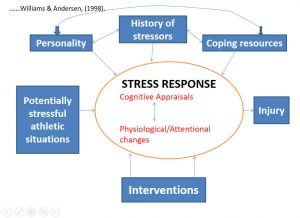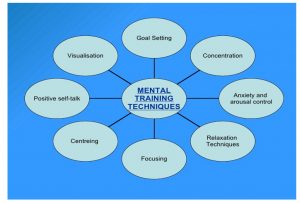Sports Injuries; a team approach of the sports physiotherapist and the sports psychologists.
WHAT THE MIND CAN CONCEIVE AND BELIEVE, IT CAN ACHIEVE
What is sport psychology?
ØStudy of human behavior in sports settings or sports injuries due to influences of:
- The athlete themselves
- The sporting environment
- The social environment
ØStudy of how performance effects the mind and how mind effects performance
ØStudy of psychological aspects of sports injuries, its prevention and rehabilitation
Aim of sports psychologists
-To provide psychological assistance to:
- Enhance performance
- Overcome psychological stress of competitions
- Prevent sports injuries
- Overcome pressure of sports injuries
- Improve adherence to rehabilitation protocols and return to play
Psychological aspects of sports injuries.
- Psychological factors that may increase athlete’s risk of developing an injury:
–History of stressors
–Personality
–Coping resource
- Psychological reactions to sports injuries and their impact
–Injury relevant information processing
–Emotional upheaval & reactive behavior
–Positive outlook & coping
–Identity loss
–Fear and anxiety
–Lack of confidence
–Performance decrements
Stress-Injury Model

Sports Psychologist Interventions

Psychological responses encountered by Physiotherapists when working with injured athletes
- From Hemmings & Povey, (2002).
| Psychological responses | Mean | SD |
|---|---|---|
| Stress/anxiety | 3.67 | 0.78 |
| Exercise addiction | 3.54 | 0.87 |
| Depression | 2.77 | 0.94 |
| Anger | 2.74 | 0.94 |
| Problems with treatment compliance | 2.70 | 0.94 |
| Problems with attention/concentration |
2.25 | 0.80 |
1=never encounter; 5= very often encounter
Characteristics of athletes who cope less successfully with sports injury
- From Hemmings & Povey, (2002).
| Characteristic | Frequency (%) |
|---|---|
| Non-compliance with rehabilitation program |
49 |
| Impatience | 29 |
| Poor motivation |
22 |
| Lack of understanding of injury |
19 |
| Depression | 19 |
| Unrealistic goals |
17 |
| Pessimism | 14 |
| Too eager to return to sport |
12 |
| Anxiety | 11 |
| Anger | 8 |
Interaction with Physiotherapist
- Sports Psychologists’ interventions are important during rehabilitation to;
–Enhance self motivation
–Encourage positive self thoughts
–Reduce stress/anxiety
–Increase concentration skills
–Teach muscular relaxation techniques
–Reduce depression
–Teach the use of mental imagery
–Enhance self confidence
–Teach emotional control strategies
–Improve social support
Conclusion
* Sports Physiotherapist+ Sports Psychologists *
ØTo create;— variety in rehabilitation program—design short & long term goals—set realistic goals—increase compliance with rehabilitation/treatment program—return to play.
Reference



Thanks, great article.
Thank you. Looking for more feedbacks, please.
Wonderful article thank you for sharing.
As a Newbie, I am always browsing online for articles that can help me. Thank you
I was wondering if you ever thought of changing the layout of your site? Its very well written; I love what youve got to say. But maybe you could a little more in the way of content so people could connect with it better. Youve got an awful lot of text for only having 1 or 2 images. Maybe you could space it out better?
hi Neva
Thank you very much for your feedback. i will definitely work on your suggestion. Keep visiting the site and subscribe. I look forward to your continuous feedback.